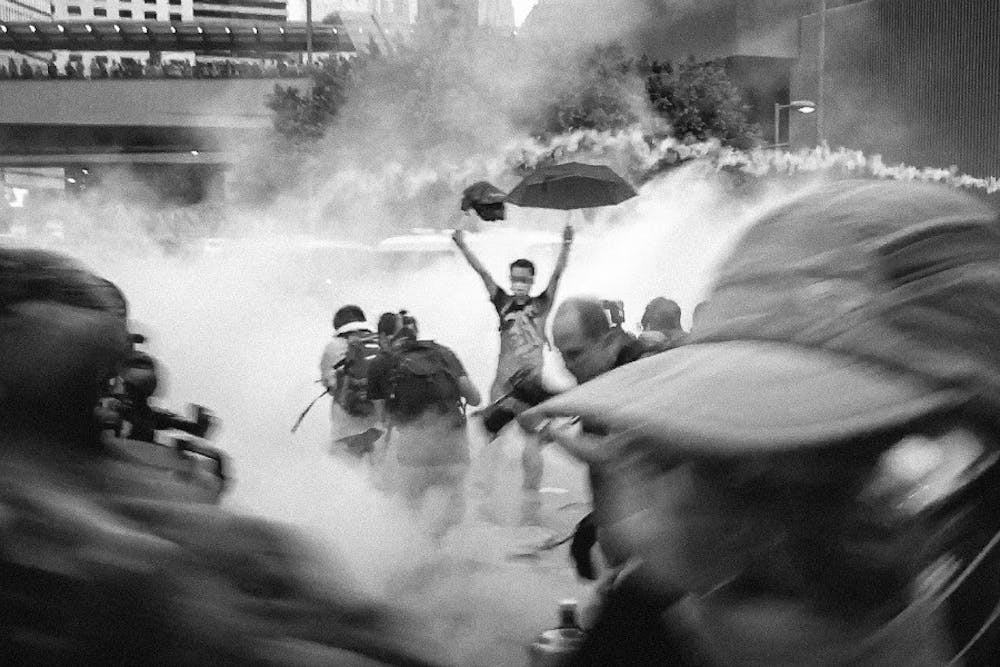Miami students and faculty feel the impact of weeks-long protesting throughout Hong Kong
By Sarah Buop, For The Miami Student
Miami University students received a first-hand experience of Hong Kong history as peaceful protesters filled the streets in hope for democracy.
It has been four weeks since the Hong Kong protests, also know as the "Umbrella Movement," have begun. Students and citizens of Hong Kong are fighting against the Chinese government for democracy and free elections in 2017.
Miami University junior Jessica Robinson, who is taking classes at Hong Kong University of Science and Technology (HKUST), said the protests have been generally non-violent.
"The protests are very peaceful.," Robinson said. "Everyone is just sitting around, talking or playing on their phones. Yes, there has been a few pepper spray incidents, but most people there have on goggles, masks and umbrellas."
According to CNN, protesters used the umbrella as a shield from the tear gas and pepper spray. Protesters began to bring and distribute umbrellas to others involved, using them as shelter to sleep, and wrote slogans on them.
"Most people are dressed in black and wear a yellow ribbon," Robinson said. "At school, you see the same thing. Students have been skipping their classes to protest and professors have been excusing them."
The yellow ribbons are used to show support of the protests. They have been tied to barricade railings and pinned on clothing to resemble a symbol of democratic aspiration.
Similar to the yellow ribbons, students have worn black T-shirts to represent the use of force on peaceful demonstrators.
"One thing I found interesting, though, was the other day I was walking through a residential area and Mainland China adults were tying blue ribbons everywhere," Robinson said. "This is representing support for Beijing in their political decisions."
Assistant Director of the Farmer School of Business International Programs, Jenni Kim, is the point of contact with students and the partner universities.
"When the protests began, our partner universities were very quick to reach out and inform us of the situation, and that they were in communication with exchange students about the protests," Kim said.
Though these protests are considered to be peaceful and nonviolent, Miami University faculty involved with international programs feel it is necessary for students to take precaution during these events.
"Although the protests in Hong Kong have been peaceful, as a safety measure, we advise students to avoid protest areas because there is always the possibility of incidents escalating," Kim said.
Associate professor at Hong Kong University of Science and Technology and researcher of the city's democracy movement Ming Sing said about two-thirds of his students have participated in the protests.
"Freedom of speech is guaranteed in Hong Kong's constitution," Sing said.
Miami University junior Josh Salzman who is taking classes at the Chinese University of Hong Kong, said he had gone to the protests several times in Mong Kok. "The first time I went after the protests I remember how quiet everything seemed and how few people I saw," Salzman said. "It was really easy to find the protesters because they had barricaded themselves in on the main street using anything to build a wall, and people had tents set up along the road."
Salzman also had some first-hand experiences when he went to visit and watch the protests.
"One very kind old lady invited us into their tent, where we got to sit and listen while a student translated what was being said," Salzman said. "We sat and talked for a very long time and something that was very surprising to me was that this 'student protest' was mostly adults, and the older generation of Hong Kong."
Many older Hong Kongese participating in the protests are witnesses of the crackdown on the Tiananmen Square protests, which were student-led demonstrations in 1989 calling for a more democratic government.
"Unless I attend the protests, they do not really interfere with my study abroad experience," Salzman said. "My campus and everyday activities are so far away from downtown I never cross paths with the real action."

